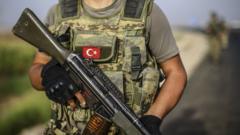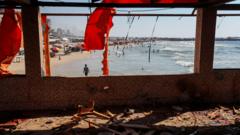The outlawed Kurdish PKK is set to begin a disarmament process, signaling a potential end to a decades-long conflict with Turkey, as President Erdogan expresses hope for peace.
Kurdish PKK Initiates Disarmament in Landmark Move Towards Peace with Turkey

Kurdish PKK Initiates Disarmament in Landmark Move Towards Peace with Turkey
Turkey's PKK Marks Symbolic Disarmament as Erdogan Praises Move
After four decades of armed conflict, the Kurdish PKK (Kurdistan Workers' Party) is preparing to lay down its arms in what could be a significant step towards resolving long-standing tensions with the Turkish government. A symbolic ceremony is scheduled for Friday in Iraqi Kurdistan, where a small group of PKK members will officially hand over their weapons. The disarmament is expected to unfold over the summer and is heavily secured, with major Turkish political parties declining to participate but pro-Kurdish representatives anticipated to attend.
Turkey’s President Recep Tayyip Erdogan reacted positively to the announcement, referring to it as a momentous occasion to break free from the violence that has defined the last 40 years. Since the conflict began in 1984, an estimated 40,000 individuals have lost their lives, contributing to the PKK's designation as a terrorist organization by Turkey as well as by the US, EU, and UK. The implications of this disarmament extend beyond Turkey, potentially influencing dynamics in Iraq, Syria, and Iran.
The initiative, however, comes against the backdrop of a history fraught with broken peace attempts. Abdullah Ocalan, the incarcerated leader of the PKK, emphasized the need for a transition from armed struggle to democratic means in a recent video message. He has been in solitary confinement since 1999 and remains a deeply influential figure among Kurds.
The ceasefire announced in 2013 deteriorated in 2015, leading to intensified violence, particularly in Kurdish regions. Recent political changes, including ongoing discussions and gestures from the Turkish government, have led Ocalan to call for the disbanding of the PKK. This shift marks a pivotal moment in a conflict rooted in issues of Kurdish autonomy and rights.
As the disarmament ceremony approaches, the Turkish parliament is expected to convene a committee focused on future steps, although substantial decisions may not materialize until after the summer recess. The treatment of Ocalan in prison and other facets of the peace process remain uncertain, with Erdogan's government indicating a review of his conditions might be on the table.
Furthermore, speculations about Erdogan's political aspirations loom, especially regarding potential constitutional changes that could facilitate his continued presidency beyond 2028. While both the ruling AK Party and the pro-Kurdish Dem party insist there is no connection between the peace talks and potential constitutional amendments, the landscape remains fluid as Turkey navigates complex political waters amidst an evolving peace process.




















